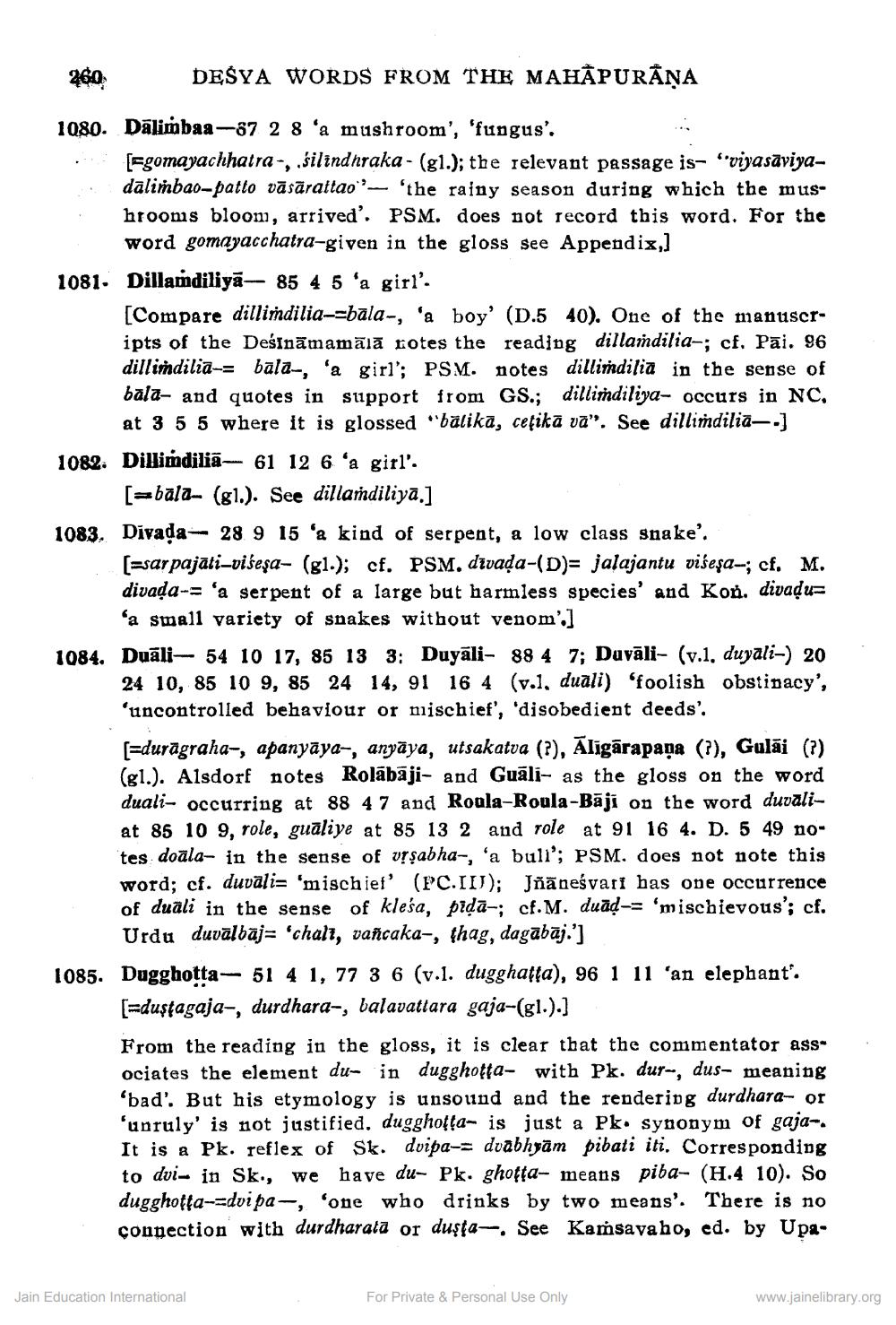________________
260
DEŠYA WORDS FROM THE MAHẤPURÃŅA
1080. Dālimbaa-37 2 8 'a mushroom', 'fungus'.
[sgomayachhatra-, silindhraka - (gl.); the relevant passage is- "viyasāviyadalimbao-patto vāsārattao' 'the rainy season during which the mushrooms bloom, arrived'. PSM. does not record this word. For the
word gomayacchatra-given in the gloss see Appendix,] 1081. Dillamdiliyā - 85 4 5 'a girl'.
[Compare dillimdilia--bala-, 'a boy' (D.5 40). One of the manuscripts of the Dešināmamālā rotes the reading dillamdilia-; cf. Pāi. 96 dillimdilia-= bala, 'a girl'; PSM. notes dillindilia in the sense of bala- and quotes in support from GS.; dillimdiliya- occurs in NC,
at 3 5 5 where it is glossed "balika, cefikā vā". See dillimdilia-.] 1082. Dilimdiliā— 61 12 6 'a girl'.
[-bala- (81.). See dillamdiliyā.] 1083. Divada- 28 9 15 'a kind of serpent, a low class snake'.
[=sar pajāti-višeşa- (gl.); cf. PSM. divada-(D)= jalajantu višeşacf. M. divada-= 'a serpent of a large but harmless species' and Kon. divadu=
'a small variety of snakes without venom.] 1084. Duāli- 54 10 17, 85 13 3: Duyāli- 884 7; Davāli- (v.1, duyali-) 20
24 10, 85 10 9, 85 24 14, 91 16 4 (v.1, duali) 'foolish obstinacy', 'uncontrolled behaviour or mischief', 'disobedient deeds'. (=durägraha-, apanyāya-, anyāya, utsakatva (?), Aligārapaņa (?), Gulāi (?) (gl.). Alsdorf notes Rolābāji- and Guāli- as the gloss on the word duali- occurring at 88 4 7 and Roala-Roula-Bāji on the word duvaliat 85 10 9, role, guāliye at 85 13 2 and role at 91 16 4. D. 5 49 notes doala- in the sense of vrşabha-, 'a bull'; PSM. does not note this word; cf. duvali= 'mischief' (PC.ID); Jñāneśvari has one occurrence of duali in the sense of klesa, pida-; cf.M. duād-= 'mischievous'; cf. Urdu duvalbāj= 'chali, vañcaka-, thag, dagabāj.']
1085. Dugghotta-51 4 1, 77 3 6 (v.1. dugghafta), 96 1 11 'an elephant.
[=dustagaja-, durdhara-, balavatlara gaja-(gl.).] From the reading in the gloss, it is clear that the commentator associates the element du- in dugghotta- with Pk. dur-, dus- meaning 'bad'. But his etymology is unsound and the rendering durdhara- or unruly' is not justified. dugghoffa- is just a Pk. synonym of gaja-. It is a Pk. reflex of Sk. dvipa- dvabhyām pibati iti. Corresponding to dvi- in Sk., we have du- Pk. ghofta- means piba- (H.4 10). So dugghoffa- dvi pa-, 'one who drinks by two means'. There is no connection with durdharata or duşta-. See Kamsava ho, ed. by Upa
Jain Education International
For Private & Personal Use Only
www.jainelibrary.org




